UK Entrepreneurship and Small Business Management: A Detailed Report
VerifiedAdded on 2023/01/19
|20
|6145
|21
Report
AI Summary
This report provides a detailed analysis of entrepreneurship and small business management, with a specific focus on the UK economy. It explores different types of entrepreneurial ventures, including public, private, and social sectors, and examines the typology of entrepreneurship, differentiating between entrepreneurial, intrapreneurial, and managerial approaches. The report highlights the impact of micro and small businesses on the UK economy, emphasizing their contribution to turnover and employment. It also discusses the traits, skills, and characteristics that differentiate entrepreneurs from managers, delving into entrepreneurial personality, motivation, and mindset. Furthermore, the study investigates how background and experience can both hinder and foster entrepreneurship. The report concludes by underscoring the importance of innovation and adaptability in driving business growth and economic development within the UK context. Desklib provides access to this and other solved assignments, offering valuable study tools for students.

ENTREPRENEURSHIP AND SMALL
BUSINESS MANAGEMENT
BUSINESS MANAGEMENT
Paraphrase This Document
Need a fresh take? Get an instant paraphrase of this document with our AI Paraphraser
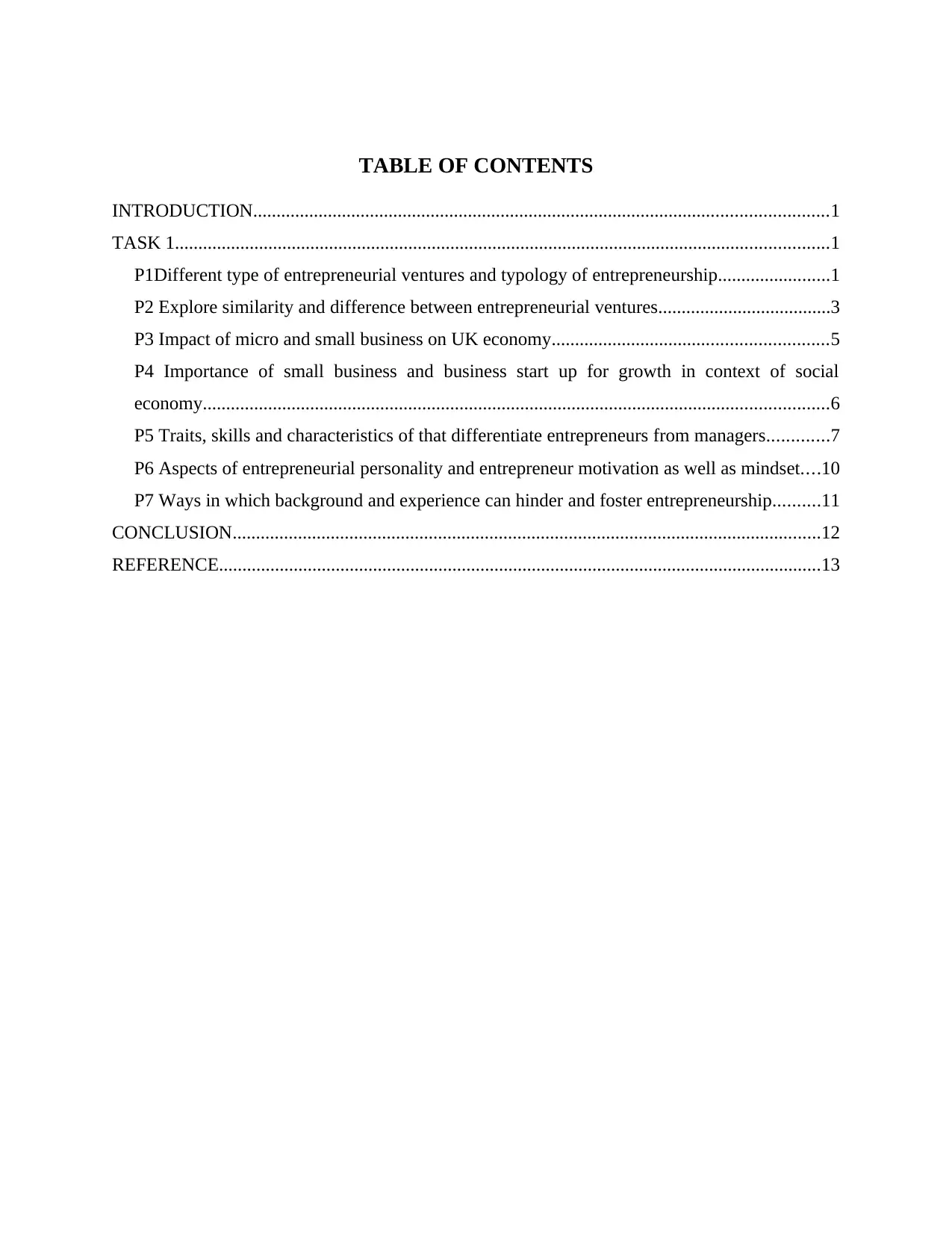
TABLE OF CONTENTS
INTRODUCTION...........................................................................................................................1
TASK 1............................................................................................................................................1
P1Different type of entrepreneurial ventures and typology of entrepreneurship........................1
P2 Explore similarity and difference between entrepreneurial ventures.....................................3
P3 Impact of micro and small business on UK economy...........................................................5
P4 Importance of small business and business start up for growth in context of social
economy......................................................................................................................................6
P5 Traits, skills and characteristics of that differentiate entrepreneurs from managers.............7
P6 Aspects of entrepreneurial personality and entrepreneur motivation as well as mindset....10
P7 Ways in which background and experience can hinder and foster entrepreneurship..........11
CONCLUSION..............................................................................................................................12
REFERENCE.................................................................................................................................13
INTRODUCTION...........................................................................................................................1
TASK 1............................................................................................................................................1
P1Different type of entrepreneurial ventures and typology of entrepreneurship........................1
P2 Explore similarity and difference between entrepreneurial ventures.....................................3
P3 Impact of micro and small business on UK economy...........................................................5
P4 Importance of small business and business start up for growth in context of social
economy......................................................................................................................................6
P5 Traits, skills and characteristics of that differentiate entrepreneurs from managers.............7
P6 Aspects of entrepreneurial personality and entrepreneur motivation as well as mindset....10
P7 Ways in which background and experience can hinder and foster entrepreneurship..........11
CONCLUSION..............................................................................................................................12
REFERENCE.................................................................................................................................13
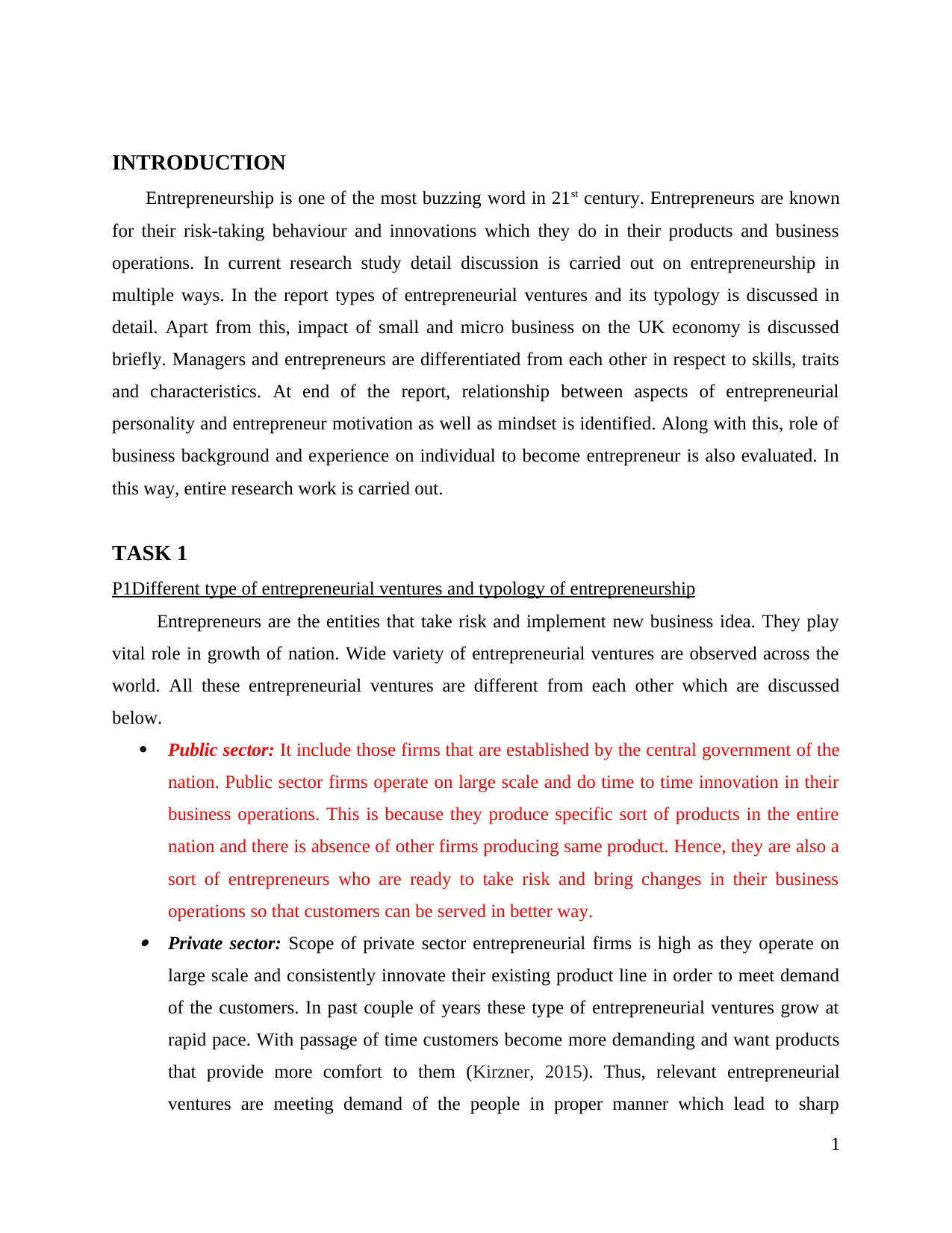
INTRODUCTION
Entrepreneurship is one of the most buzzing word in 21st century. Entrepreneurs are known
for their risk-taking behaviour and innovations which they do in their products and business
operations. In current research study detail discussion is carried out on entrepreneurship in
multiple ways. In the report types of entrepreneurial ventures and its typology is discussed in
detail. Apart from this, impact of small and micro business on the UK economy is discussed
briefly. Managers and entrepreneurs are differentiated from each other in respect to skills, traits
and characteristics. At end of the report, relationship between aspects of entrepreneurial
personality and entrepreneur motivation as well as mindset is identified. Along with this, role of
business background and experience on individual to become entrepreneur is also evaluated. In
this way, entire research work is carried out.
TASK 1
P1Different type of entrepreneurial ventures and typology of entrepreneurship
Entrepreneurs are the entities that take risk and implement new business idea. They play
vital role in growth of nation. Wide variety of entrepreneurial ventures are observed across the
world. All these entrepreneurial ventures are different from each other which are discussed
below.
Public sector: It include those firms that are established by the central government of the
nation. Public sector firms operate on large scale and do time to time innovation in their
business operations. This is because they produce specific sort of products in the entire
nation and there is absence of other firms producing same product. Hence, they are also a
sort of entrepreneurs who are ready to take risk and bring changes in their business
operations so that customers can be served in better way. Private sector: Scope of private sector entrepreneurial firms is high as they operate on
large scale and consistently innovate their existing product line in order to meet demand
of the customers. In past couple of years these type of entrepreneurial ventures grow at
rapid pace. With passage of time customers become more demanding and want products
that provide more comfort to them (Kirzner, 2015). Thus, relevant entrepreneurial
ventures are meeting demand of the people in proper manner which lead to sharp
1
Entrepreneurship is one of the most buzzing word in 21st century. Entrepreneurs are known
for their risk-taking behaviour and innovations which they do in their products and business
operations. In current research study detail discussion is carried out on entrepreneurship in
multiple ways. In the report types of entrepreneurial ventures and its typology is discussed in
detail. Apart from this, impact of small and micro business on the UK economy is discussed
briefly. Managers and entrepreneurs are differentiated from each other in respect to skills, traits
and characteristics. At end of the report, relationship between aspects of entrepreneurial
personality and entrepreneur motivation as well as mindset is identified. Along with this, role of
business background and experience on individual to become entrepreneur is also evaluated. In
this way, entire research work is carried out.
TASK 1
P1Different type of entrepreneurial ventures and typology of entrepreneurship
Entrepreneurs are the entities that take risk and implement new business idea. They play
vital role in growth of nation. Wide variety of entrepreneurial ventures are observed across the
world. All these entrepreneurial ventures are different from each other which are discussed
below.
Public sector: It include those firms that are established by the central government of the
nation. Public sector firms operate on large scale and do time to time innovation in their
business operations. This is because they produce specific sort of products in the entire
nation and there is absence of other firms producing same product. Hence, they are also a
sort of entrepreneurs who are ready to take risk and bring changes in their business
operations so that customers can be served in better way. Private sector: Scope of private sector entrepreneurial firms is high as they operate on
large scale and consistently innovate their existing product line in order to meet demand
of the customers. In past couple of years these type of entrepreneurial ventures grow at
rapid pace. With passage of time customers become more demanding and want products
that provide more comfort to them (Kirzner, 2015). Thus, relevant entrepreneurial
ventures are meeting demand of the people in proper manner which lead to sharp
1
⊘ This is a preview!⊘
Do you want full access?
Subscribe today to unlock all pages.

Trusted by 1+ million students worldwide
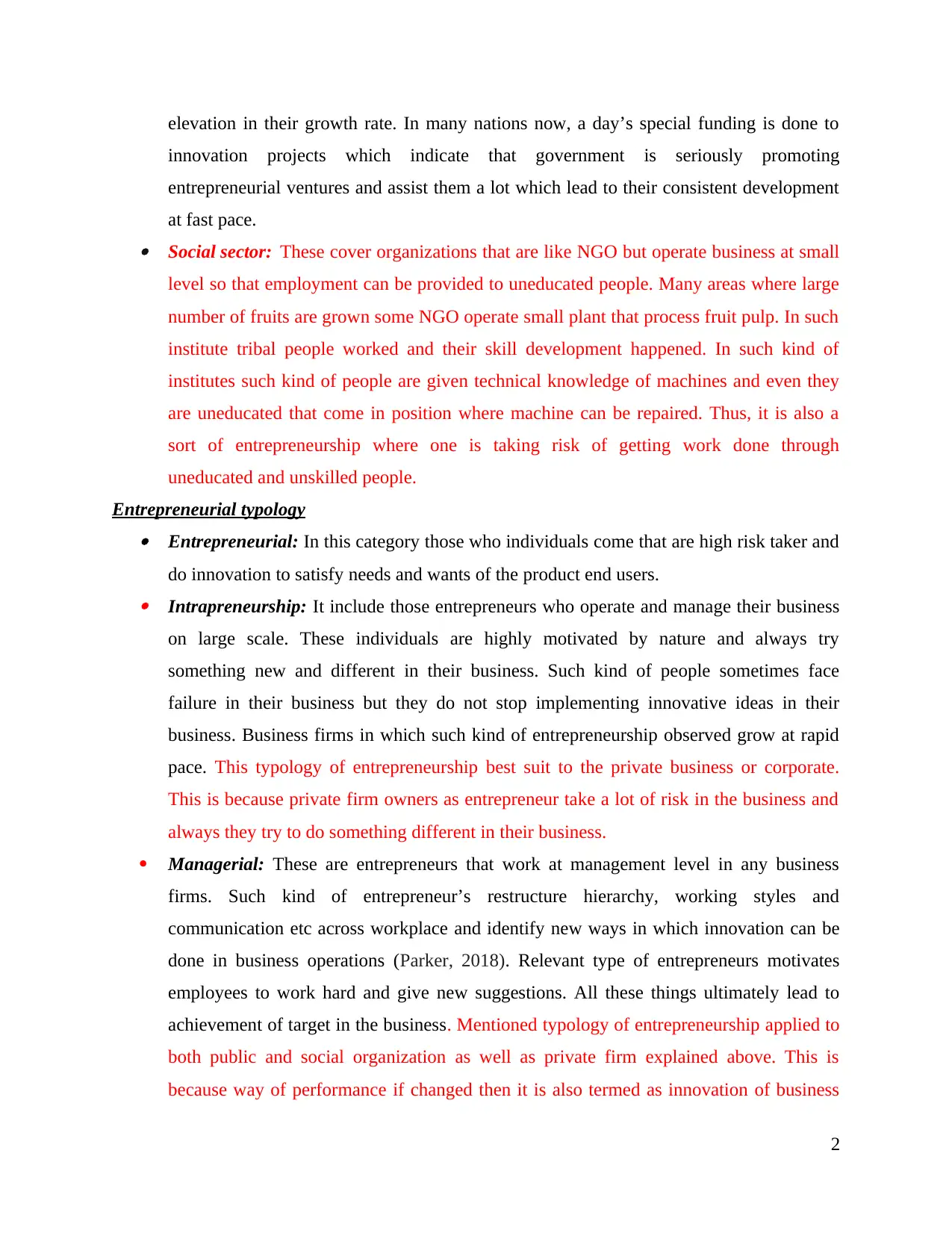
elevation in their growth rate. In many nations now, a day’s special funding is done to
innovation projects which indicate that government is seriously promoting
entrepreneurial ventures and assist them a lot which lead to their consistent development
at fast pace. Social sector: These cover organizations that are like NGO but operate business at small
level so that employment can be provided to uneducated people. Many areas where large
number of fruits are grown some NGO operate small plant that process fruit pulp. In such
institute tribal people worked and their skill development happened. In such kind of
institutes such kind of people are given technical knowledge of machines and even they
are uneducated that come in position where machine can be repaired. Thus, it is also a
sort of entrepreneurship where one is taking risk of getting work done through
uneducated and unskilled people.
Entrepreneurial typology Entrepreneurial: In this category those who individuals come that are high risk taker and
do innovation to satisfy needs and wants of the product end users. Intrapreneurship: It include those entrepreneurs who operate and manage their business
on large scale. These individuals are highly motivated by nature and always try
something new and different in their business. Such kind of people sometimes face
failure in their business but they do not stop implementing innovative ideas in their
business. Business firms in which such kind of entrepreneurship observed grow at rapid
pace. This typology of entrepreneurship best suit to the private business or corporate.
This is because private firm owners as entrepreneur take a lot of risk in the business and
always they try to do something different in their business.
Managerial: These are entrepreneurs that work at management level in any business
firms. Such kind of entrepreneur’s restructure hierarchy, working styles and
communication etc across workplace and identify new ways in which innovation can be
done in business operations (Parker, 2018). Relevant type of entrepreneurs motivates
employees to work hard and give new suggestions. All these things ultimately lead to
achievement of target in the business. Mentioned typology of entrepreneurship applied to
both public and social organization as well as private firm explained above. This is
because way of performance if changed then it is also termed as innovation of business
2
innovation projects which indicate that government is seriously promoting
entrepreneurial ventures and assist them a lot which lead to their consistent development
at fast pace. Social sector: These cover organizations that are like NGO but operate business at small
level so that employment can be provided to uneducated people. Many areas where large
number of fruits are grown some NGO operate small plant that process fruit pulp. In such
institute tribal people worked and their skill development happened. In such kind of
institutes such kind of people are given technical knowledge of machines and even they
are uneducated that come in position where machine can be repaired. Thus, it is also a
sort of entrepreneurship where one is taking risk of getting work done through
uneducated and unskilled people.
Entrepreneurial typology Entrepreneurial: In this category those who individuals come that are high risk taker and
do innovation to satisfy needs and wants of the product end users. Intrapreneurship: It include those entrepreneurs who operate and manage their business
on large scale. These individuals are highly motivated by nature and always try
something new and different in their business. Such kind of people sometimes face
failure in their business but they do not stop implementing innovative ideas in their
business. Business firms in which such kind of entrepreneurship observed grow at rapid
pace. This typology of entrepreneurship best suit to the private business or corporate.
This is because private firm owners as entrepreneur take a lot of risk in the business and
always they try to do something different in their business.
Managerial: These are entrepreneurs that work at management level in any business
firms. Such kind of entrepreneur’s restructure hierarchy, working styles and
communication etc across workplace and identify new ways in which innovation can be
done in business operations (Parker, 2018). Relevant type of entrepreneurs motivates
employees to work hard and give new suggestions. All these things ultimately lead to
achievement of target in the business. Mentioned typology of entrepreneurship applied to
both public and social organization as well as private firm explained above. This is
because way of performance if changed then it is also termed as innovation of business
2
Paraphrase This Document
Need a fresh take? Get an instant paraphrase of this document with our AI Paraphraser
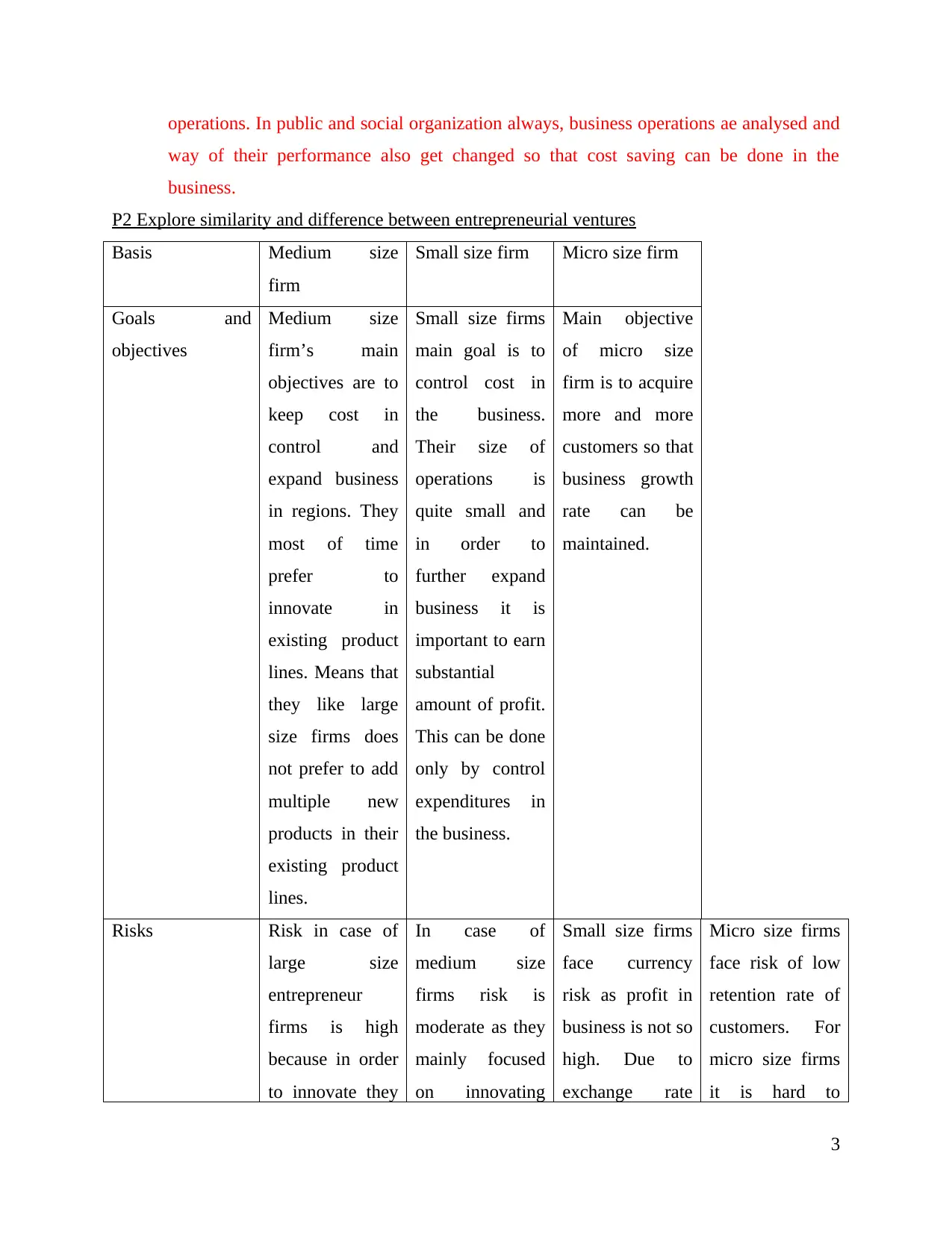
operations. In public and social organization always, business operations ae analysed and
way of their performance also get changed so that cost saving can be done in the
business.
P2 Explore similarity and difference between entrepreneurial ventures
Basis Medium size
firm
Small size firm Micro size firm
Goals and
objectives
Medium size
firm’s main
objectives are to
keep cost in
control and
expand business
in regions. They
most of time
prefer to
innovate in
existing product
lines. Means that
they like large
size firms does
not prefer to add
multiple new
products in their
existing product
lines.
Small size firms
main goal is to
control cost in
the business.
Their size of
operations is
quite small and
in order to
further expand
business it is
important to earn
substantial
amount of profit.
This can be done
only by control
expenditures in
the business.
Main objective
of micro size
firm is to acquire
more and more
customers so that
business growth
rate can be
maintained.
Risks Risk in case of
large size
entrepreneur
firms is high
because in order
to innovate they
In case of
medium size
firms risk is
moderate as they
mainly focused
on innovating
Small size firms
face currency
risk as profit in
business is not so
high. Due to
exchange rate
Micro size firms
face risk of low
retention rate of
customers. For
micro size firms
it is hard to
3
way of their performance also get changed so that cost saving can be done in the
business.
P2 Explore similarity and difference between entrepreneurial ventures
Basis Medium size
firm
Small size firm Micro size firm
Goals and
objectives
Medium size
firm’s main
objectives are to
keep cost in
control and
expand business
in regions. They
most of time
prefer to
innovate in
existing product
lines. Means that
they like large
size firms does
not prefer to add
multiple new
products in their
existing product
lines.
Small size firms
main goal is to
control cost in
the business.
Their size of
operations is
quite small and
in order to
further expand
business it is
important to earn
substantial
amount of profit.
This can be done
only by control
expenditures in
the business.
Main objective
of micro size
firm is to acquire
more and more
customers so that
business growth
rate can be
maintained.
Risks Risk in case of
large size
entrepreneur
firms is high
because in order
to innovate they
In case of
medium size
firms risk is
moderate as they
mainly focused
on innovating
Small size firms
face currency
risk as profit in
business is not so
high. Due to
exchange rate
Micro size firms
face risk of low
retention rate of
customers. For
micro size firms
it is hard to
3
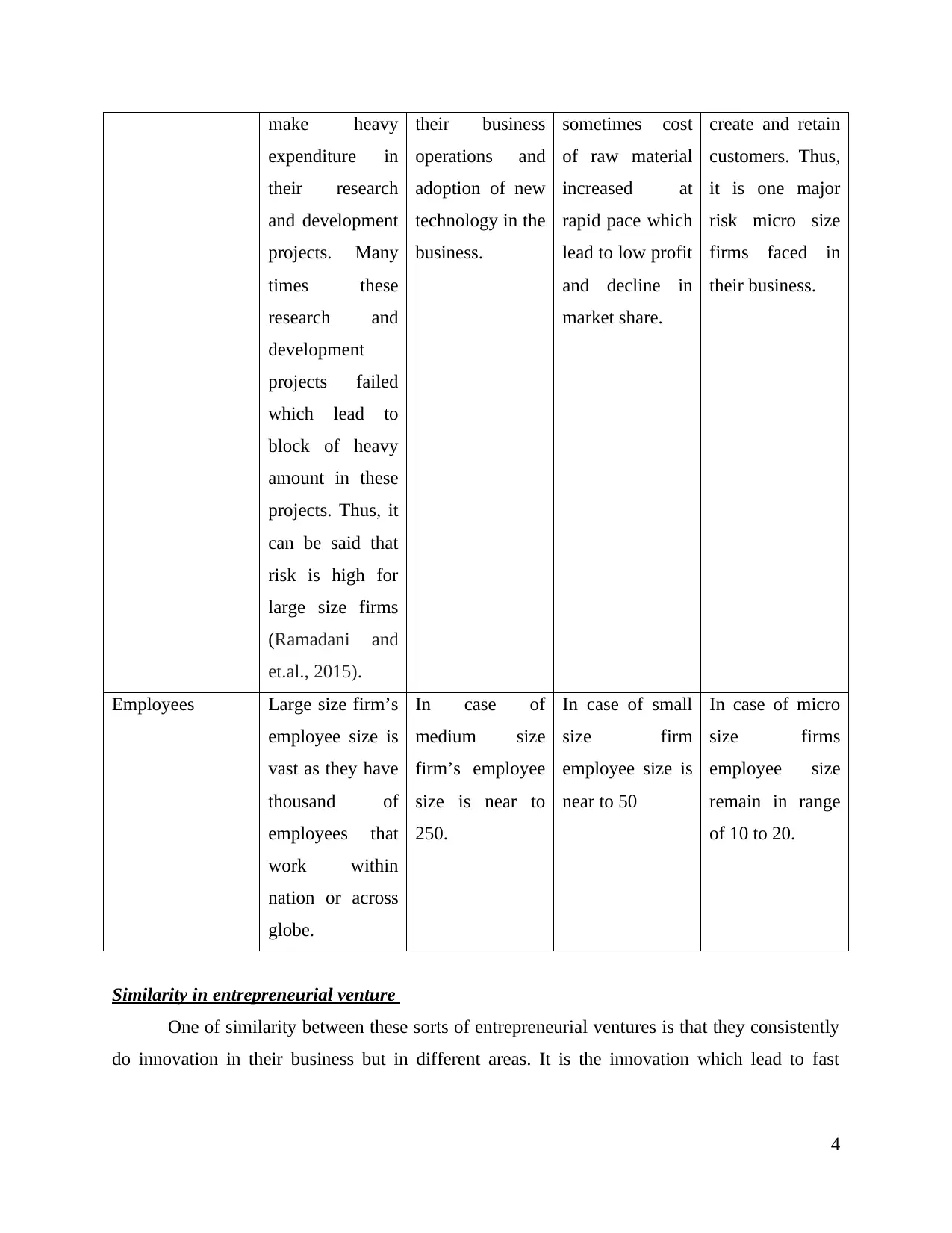
make heavy
expenditure in
their research
and development
projects. Many
times these
research and
development
projects failed
which lead to
block of heavy
amount in these
projects. Thus, it
can be said that
risk is high for
large size firms
(Ramadani and
et.al., 2015).
their business
operations and
adoption of new
technology in the
business.
sometimes cost
of raw material
increased at
rapid pace which
lead to low profit
and decline in
market share.
create and retain
customers. Thus,
it is one major
risk micro size
firms faced in
their business.
Employees Large size firm’s
employee size is
vast as they have
thousand of
employees that
work within
nation or across
globe.
In case of
medium size
firm’s employee
size is near to
250.
In case of small
size firm
employee size is
near to 50
In case of micro
size firms
employee size
remain in range
of 10 to 20.
Similarity in entrepreneurial venture
One of similarity between these sorts of entrepreneurial ventures is that they consistently
do innovation in their business but in different areas. It is the innovation which lead to fast
4
expenditure in
their research
and development
projects. Many
times these
research and
development
projects failed
which lead to
block of heavy
amount in these
projects. Thus, it
can be said that
risk is high for
large size firms
(Ramadani and
et.al., 2015).
their business
operations and
adoption of new
technology in the
business.
sometimes cost
of raw material
increased at
rapid pace which
lead to low profit
and decline in
market share.
create and retain
customers. Thus,
it is one major
risk micro size
firms faced in
their business.
Employees Large size firm’s
employee size is
vast as they have
thousand of
employees that
work within
nation or across
globe.
In case of
medium size
firm’s employee
size is near to
250.
In case of small
size firm
employee size is
near to 50
In case of micro
size firms
employee size
remain in range
of 10 to 20.
Similarity in entrepreneurial venture
One of similarity between these sorts of entrepreneurial ventures is that they consistently
do innovation in their business but in different areas. It is the innovation which lead to fast
4
⊘ This is a preview!⊘
Do you want full access?
Subscribe today to unlock all pages.

Trusted by 1+ million students worldwide

business growth. It can be said that more is the innovation of products and operations more
business will observe success.
Difference between public, private and social sector
Basis Public sector Private sector Social sector
Meaning It refers to the sector
that is under
government control
like atomic energy
station etc.
It is the sector which
is owned and control
by individuals or their
group.
It refers to business
firm or organization
that is run for welfare
of the people.
Basic objective Its main objective is
to serve nation people.
Its main objective is
to earn profit.
Main objective is to
make people able to
earn livelihood.
Raises money from Tax and bond. Shares and debt. Government funding
Common things between public, private and social sector
Common between public, private and social sector is that they are open to change and
when any change comes in the situation public, private and social institutes take some innovative
step to handle relevant situation.
Entrepreneurship in public and corporate sector Public sector: In public sector firms entrepreneurship usually observed at very low level.
This is because government firms are largely dependent on Government to carry out their
research and development operations. Usually, government firms main motive is social
welfare not profit motive and due to this reason, less number of government firms carry
out innovation on large scale. However, these firms consistently innovate their supply
chain and other business manufacturing activities which lead to cost control and increase
in business profit (Roig-Tierno, Alcazar and Ribeiro-Navarrete, 2015).
Corporate sector: These firms have huge resources and connections across globe and due
to this reason successfully carry out large size research and development projects. Firms
like GSK operate multiple R&D projects in single time. Some of them also failed but
5
business will observe success.
Difference between public, private and social sector
Basis Public sector Private sector Social sector
Meaning It refers to the sector
that is under
government control
like atomic energy
station etc.
It is the sector which
is owned and control
by individuals or their
group.
It refers to business
firm or organization
that is run for welfare
of the people.
Basic objective Its main objective is
to serve nation people.
Its main objective is
to earn profit.
Main objective is to
make people able to
earn livelihood.
Raises money from Tax and bond. Shares and debt. Government funding
Common things between public, private and social sector
Common between public, private and social sector is that they are open to change and
when any change comes in the situation public, private and social institutes take some innovative
step to handle relevant situation.
Entrepreneurship in public and corporate sector Public sector: In public sector firms entrepreneurship usually observed at very low level.
This is because government firms are largely dependent on Government to carry out their
research and development operations. Usually, government firms main motive is social
welfare not profit motive and due to this reason, less number of government firms carry
out innovation on large scale. However, these firms consistently innovate their supply
chain and other business manufacturing activities which lead to cost control and increase
in business profit (Roig-Tierno, Alcazar and Ribeiro-Navarrete, 2015).
Corporate sector: These firms have huge resources and connections across globe and due
to this reason successfully carry out large size research and development projects. Firms
like GSK operate multiple R&D projects in single time. Some of them also failed but
5
Paraphrase This Document
Need a fresh take? Get an instant paraphrase of this document with our AI Paraphraser
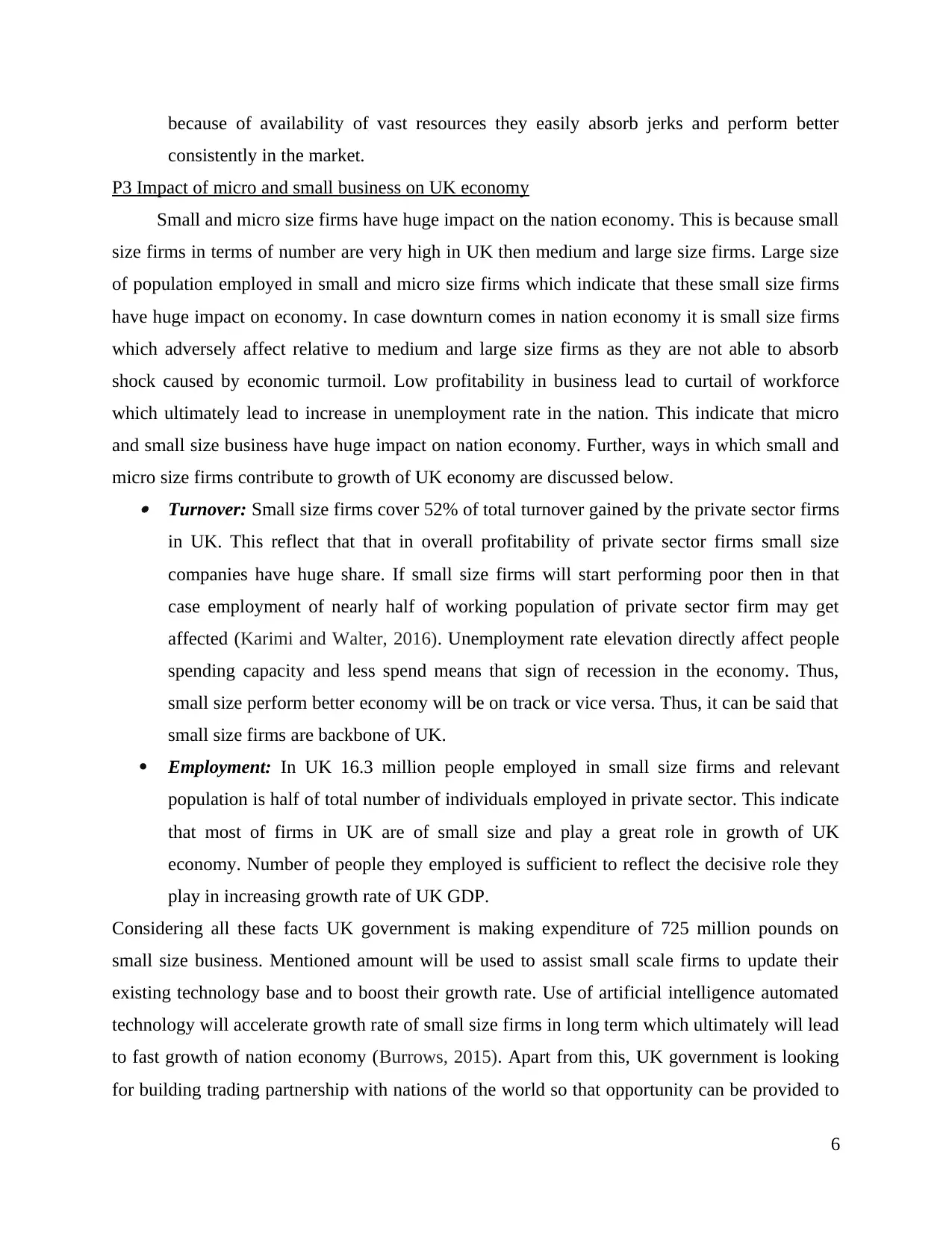
because of availability of vast resources they easily absorb jerks and perform better
consistently in the market.
P3 Impact of micro and small business on UK economy
Small and micro size firms have huge impact on the nation economy. This is because small
size firms in terms of number are very high in UK then medium and large size firms. Large size
of population employed in small and micro size firms which indicate that these small size firms
have huge impact on economy. In case downturn comes in nation economy it is small size firms
which adversely affect relative to medium and large size firms as they are not able to absorb
shock caused by economic turmoil. Low profitability in business lead to curtail of workforce
which ultimately lead to increase in unemployment rate in the nation. This indicate that micro
and small size business have huge impact on nation economy. Further, ways in which small and
micro size firms contribute to growth of UK economy are discussed below. Turnover: Small size firms cover 52% of total turnover gained by the private sector firms
in UK. This reflect that that in overall profitability of private sector firms small size
companies have huge share. If small size firms will start performing poor then in that
case employment of nearly half of working population of private sector firm may get
affected (Karimi and Walter, 2016). Unemployment rate elevation directly affect people
spending capacity and less spend means that sign of recession in the economy. Thus,
small size perform better economy will be on track or vice versa. Thus, it can be said that
small size firms are backbone of UK.
Employment: In UK 16.3 million people employed in small size firms and relevant
population is half of total number of individuals employed in private sector. This indicate
that most of firms in UK are of small size and play a great role in growth of UK
economy. Number of people they employed is sufficient to reflect the decisive role they
play in increasing growth rate of UK GDP.
Considering all these facts UK government is making expenditure of 725 million pounds on
small size business. Mentioned amount will be used to assist small scale firms to update their
existing technology base and to boost their growth rate. Use of artificial intelligence automated
technology will accelerate growth rate of small size firms in long term which ultimately will lead
to fast growth of nation economy (Burrows, 2015). Apart from this, UK government is looking
for building trading partnership with nations of the world so that opportunity can be provided to
6
consistently in the market.
P3 Impact of micro and small business on UK economy
Small and micro size firms have huge impact on the nation economy. This is because small
size firms in terms of number are very high in UK then medium and large size firms. Large size
of population employed in small and micro size firms which indicate that these small size firms
have huge impact on economy. In case downturn comes in nation economy it is small size firms
which adversely affect relative to medium and large size firms as they are not able to absorb
shock caused by economic turmoil. Low profitability in business lead to curtail of workforce
which ultimately lead to increase in unemployment rate in the nation. This indicate that micro
and small size business have huge impact on nation economy. Further, ways in which small and
micro size firms contribute to growth of UK economy are discussed below. Turnover: Small size firms cover 52% of total turnover gained by the private sector firms
in UK. This reflect that that in overall profitability of private sector firms small size
companies have huge share. If small size firms will start performing poor then in that
case employment of nearly half of working population of private sector firm may get
affected (Karimi and Walter, 2016). Unemployment rate elevation directly affect people
spending capacity and less spend means that sign of recession in the economy. Thus,
small size perform better economy will be on track or vice versa. Thus, it can be said that
small size firms are backbone of UK.
Employment: In UK 16.3 million people employed in small size firms and relevant
population is half of total number of individuals employed in private sector. This indicate
that most of firms in UK are of small size and play a great role in growth of UK
economy. Number of people they employed is sufficient to reflect the decisive role they
play in increasing growth rate of UK GDP.
Considering all these facts UK government is making expenditure of 725 million pounds on
small size business. Mentioned amount will be used to assist small scale firms to update their
existing technology base and to boost their growth rate. Use of artificial intelligence automated
technology will accelerate growth rate of small size firms in long term which ultimately will lead
to fast growth of nation economy (Burrows, 2015). Apart from this, UK government is looking
for building trading partnership with nations of the world so that opportunity can be provided to
6

small scale firms to export their products in foreign nation so that maximum profit can be gained
in the business. Thus, it can be said that small size firms play a vital role in growth of UK
economy and to further increase its contribution in growth rate financial assistance is provide by
local government so that business operations innovation activity can not be hampered. It is
expected that in the upcoming time period also lot of steps will be taken by the UK government
to provide more and more assistance to the small size firms so that their growth can be ensured in
upcoming time period. By taking all these steps UK government is motivating youngsters to
open more and more business so that economic growth rate can be increased to maximum
possible extent.
Entrepreneurship is seen in the UK at wide level as it can be seen that last year 6,60,000
new ventures were established in the UK. In previous year number of business ventures were
6,08,000. Thus, it can be said that rate of growth of number of ventures also increase at rapid
rate. It is observed that after 2008 number of ventures increase at higher percentage because
Government at its own level make substantial efforts to promote individual to open their own
business. In year 2010 also, some of Government sponsored initiatives were taken which
promote individuals to become entrepreneur. As per facts loan scheme was prepared in the year
2012 which allot £300 million to the start ups that are in 46000 in number. Thus, it can be said
that entrepreneurs are playing crucial role in the business success.
Figure 1Employment, turnover and business of SME in UK
(Source: Business statistics., 2019)
7
in the business. Thus, it can be said that small size firms play a vital role in growth of UK
economy and to further increase its contribution in growth rate financial assistance is provide by
local government so that business operations innovation activity can not be hampered. It is
expected that in the upcoming time period also lot of steps will be taken by the UK government
to provide more and more assistance to the small size firms so that their growth can be ensured in
upcoming time period. By taking all these steps UK government is motivating youngsters to
open more and more business so that economic growth rate can be increased to maximum
possible extent.
Entrepreneurship is seen in the UK at wide level as it can be seen that last year 6,60,000
new ventures were established in the UK. In previous year number of business ventures were
6,08,000. Thus, it can be said that rate of growth of number of ventures also increase at rapid
rate. It is observed that after 2008 number of ventures increase at higher percentage because
Government at its own level make substantial efforts to promote individual to open their own
business. In year 2010 also, some of Government sponsored initiatives were taken which
promote individuals to become entrepreneur. As per facts loan scheme was prepared in the year
2012 which allot £300 million to the start ups that are in 46000 in number. Thus, it can be said
that entrepreneurs are playing crucial role in the business success.
Figure 1Employment, turnover and business of SME in UK
(Source: Business statistics., 2019)
7
⊘ This is a preview!⊘
Do you want full access?
Subscribe today to unlock all pages.

Trusted by 1+ million students worldwide
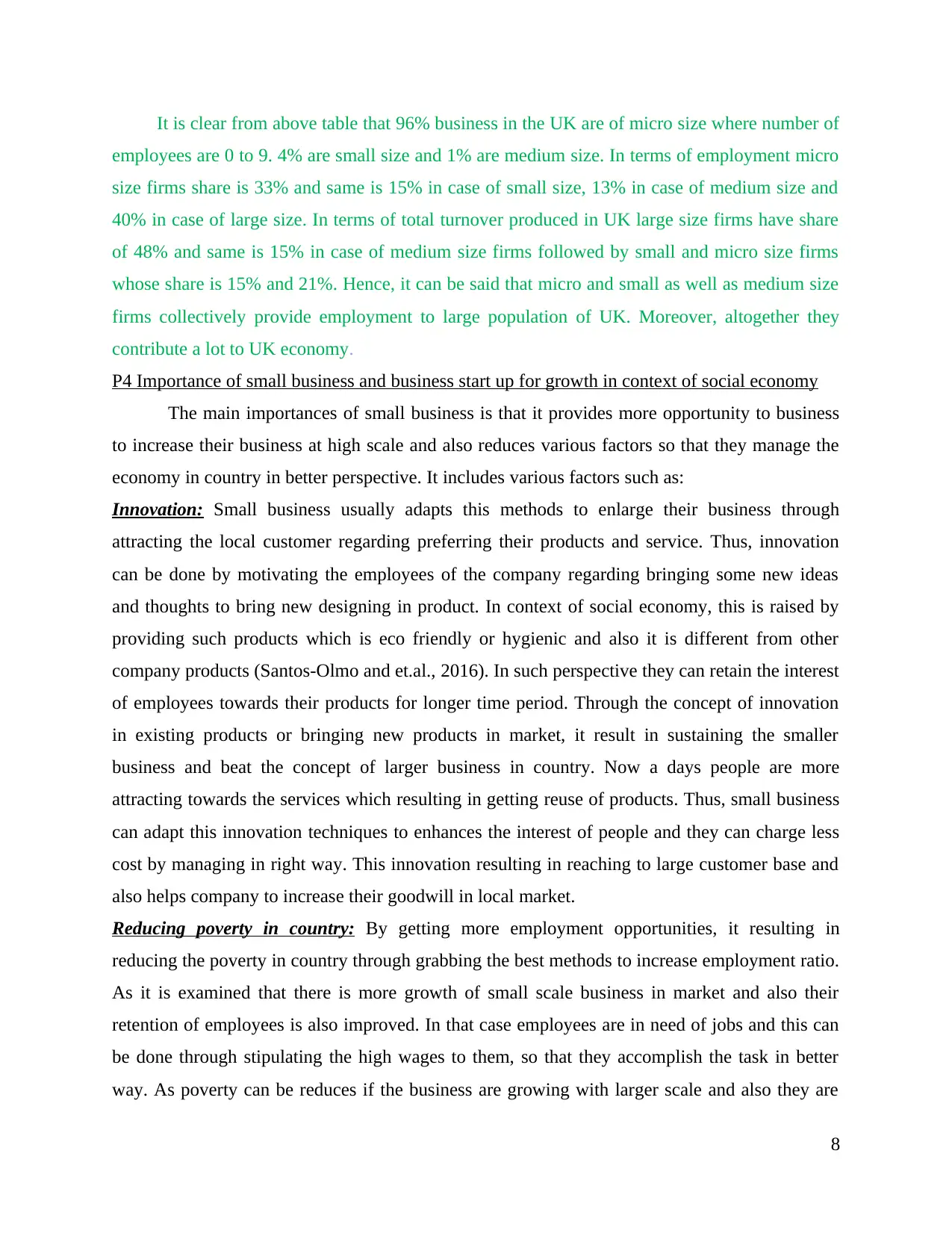
It is clear from above table that 96% business in the UK are of micro size where number of
employees are 0 to 9. 4% are small size and 1% are medium size. In terms of employment micro
size firms share is 33% and same is 15% in case of small size, 13% in case of medium size and
40% in case of large size. In terms of total turnover produced in UK large size firms have share
of 48% and same is 15% in case of medium size firms followed by small and micro size firms
whose share is 15% and 21%. Hence, it can be said that micro and small as well as medium size
firms collectively provide employment to large population of UK. Moreover, altogether they
contribute a lot to UK economy.
P4 Importance of small business and business start up for growth in context of social economy
The main importances of small business is that it provides more opportunity to business
to increase their business at high scale and also reduces various factors so that they manage the
economy in country in better perspective. It includes various factors such as:
Innovation: Small business usually adapts this methods to enlarge their business through
attracting the local customer regarding preferring their products and service. Thus, innovation
can be done by motivating the employees of the company regarding bringing some new ideas
and thoughts to bring new designing in product. In context of social economy, this is raised by
providing such products which is eco friendly or hygienic and also it is different from other
company products (Santos-Olmo and et.al., 2016). In such perspective they can retain the interest
of employees towards their products for longer time period. Through the concept of innovation
in existing products or bringing new products in market, it result in sustaining the smaller
business and beat the concept of larger business in country. Now a days people are more
attracting towards the services which resulting in getting reuse of products. Thus, small business
can adapt this innovation techniques to enhances the interest of people and they can charge less
cost by managing in right way. This innovation resulting in reaching to large customer base and
also helps company to increase their goodwill in local market.
Reducing poverty in country: By getting more employment opportunities, it resulting in
reducing the poverty in country through grabbing the best methods to increase employment ratio.
As it is examined that there is more growth of small scale business in market and also their
retention of employees is also improved. In that case employees are in need of jobs and this can
be done through stipulating the high wages to them, so that they accomplish the task in better
way. As poverty can be reduces if the business are growing with larger scale and also they are
8
employees are 0 to 9. 4% are small size and 1% are medium size. In terms of employment micro
size firms share is 33% and same is 15% in case of small size, 13% in case of medium size and
40% in case of large size. In terms of total turnover produced in UK large size firms have share
of 48% and same is 15% in case of medium size firms followed by small and micro size firms
whose share is 15% and 21%. Hence, it can be said that micro and small as well as medium size
firms collectively provide employment to large population of UK. Moreover, altogether they
contribute a lot to UK economy.
P4 Importance of small business and business start up for growth in context of social economy
The main importances of small business is that it provides more opportunity to business
to increase their business at high scale and also reduces various factors so that they manage the
economy in country in better perspective. It includes various factors such as:
Innovation: Small business usually adapts this methods to enlarge their business through
attracting the local customer regarding preferring their products and service. Thus, innovation
can be done by motivating the employees of the company regarding bringing some new ideas
and thoughts to bring new designing in product. In context of social economy, this is raised by
providing such products which is eco friendly or hygienic and also it is different from other
company products (Santos-Olmo and et.al., 2016). In such perspective they can retain the interest
of employees towards their products for longer time period. Through the concept of innovation
in existing products or bringing new products in market, it result in sustaining the smaller
business and beat the concept of larger business in country. Now a days people are more
attracting towards the services which resulting in getting reuse of products. Thus, small business
can adapt this innovation techniques to enhances the interest of people and they can charge less
cost by managing in right way. This innovation resulting in reaching to large customer base and
also helps company to increase their goodwill in local market.
Reducing poverty in country: By getting more employment opportunities, it resulting in
reducing the poverty in country through grabbing the best methods to increase employment ratio.
As it is examined that there is more growth of small scale business in market and also their
retention of employees is also improved. In that case employees are in need of jobs and this can
be done through stipulating the high wages to them, so that they accomplish the task in better
way. As poverty can be reduces if the business are growing with larger scale and also they are
8
Paraphrase This Document
Need a fresh take? Get an instant paraphrase of this document with our AI Paraphraser
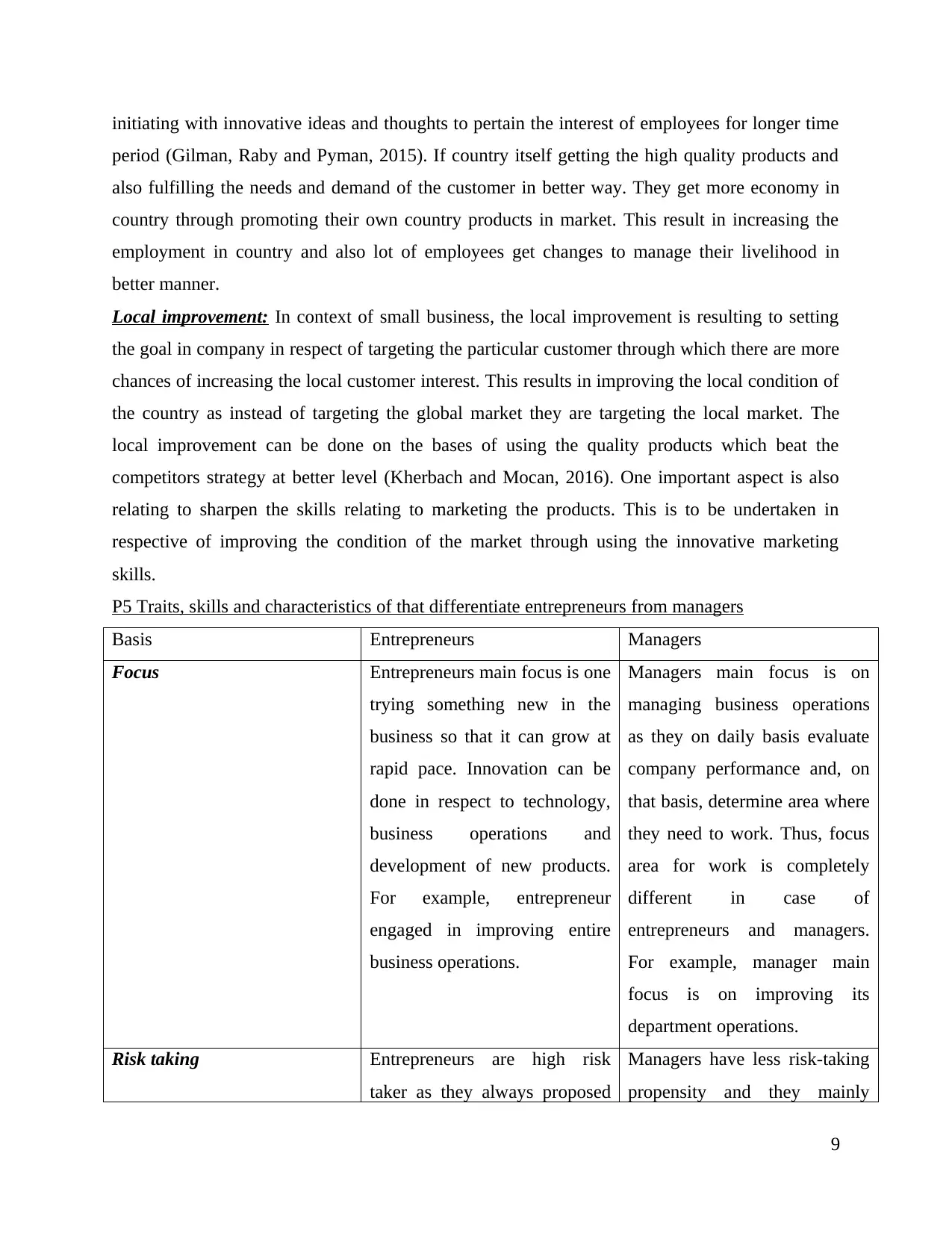
initiating with innovative ideas and thoughts to pertain the interest of employees for longer time
period (Gilman, Raby and Pyman, 2015). If country itself getting the high quality products and
also fulfilling the needs and demand of the customer in better way. They get more economy in
country through promoting their own country products in market. This result in increasing the
employment in country and also lot of employees get changes to manage their livelihood in
better manner.
Local improvement: In context of small business, the local improvement is resulting to setting
the goal in company in respect of targeting the particular customer through which there are more
chances of increasing the local customer interest. This results in improving the local condition of
the country as instead of targeting the global market they are targeting the local market. The
local improvement can be done on the bases of using the quality products which beat the
competitors strategy at better level (Kherbach and Mocan, 2016). One important aspect is also
relating to sharpen the skills relating to marketing the products. This is to be undertaken in
respective of improving the condition of the market through using the innovative marketing
skills.
P5 Traits, skills and characteristics of that differentiate entrepreneurs from managers
Basis Entrepreneurs Managers
Focus Entrepreneurs main focus is one
trying something new in the
business so that it can grow at
rapid pace. Innovation can be
done in respect to technology,
business operations and
development of new products.
For example, entrepreneur
engaged in improving entire
business operations.
Managers main focus is on
managing business operations
as they on daily basis evaluate
company performance and, on
that basis, determine area where
they need to work. Thus, focus
area for work is completely
different in case of
entrepreneurs and managers.
For example, manager main
focus is on improving its
department operations.
Risk taking Entrepreneurs are high risk
taker as they always proposed
Managers have less risk-taking
propensity and they mainly
9
period (Gilman, Raby and Pyman, 2015). If country itself getting the high quality products and
also fulfilling the needs and demand of the customer in better way. They get more economy in
country through promoting their own country products in market. This result in increasing the
employment in country and also lot of employees get changes to manage their livelihood in
better manner.
Local improvement: In context of small business, the local improvement is resulting to setting
the goal in company in respect of targeting the particular customer through which there are more
chances of increasing the local customer interest. This results in improving the local condition of
the country as instead of targeting the global market they are targeting the local market. The
local improvement can be done on the bases of using the quality products which beat the
competitors strategy at better level (Kherbach and Mocan, 2016). One important aspect is also
relating to sharpen the skills relating to marketing the products. This is to be undertaken in
respective of improving the condition of the market through using the innovative marketing
skills.
P5 Traits, skills and characteristics of that differentiate entrepreneurs from managers
Basis Entrepreneurs Managers
Focus Entrepreneurs main focus is one
trying something new in the
business so that it can grow at
rapid pace. Innovation can be
done in respect to technology,
business operations and
development of new products.
For example, entrepreneur
engaged in improving entire
business operations.
Managers main focus is on
managing business operations
as they on daily basis evaluate
company performance and, on
that basis, determine area where
they need to work. Thus, focus
area for work is completely
different in case of
entrepreneurs and managers.
For example, manager main
focus is on improving its
department operations.
Risk taking Entrepreneurs are high risk
taker as they always proposed
Managers have less risk-taking
propensity and they mainly
9
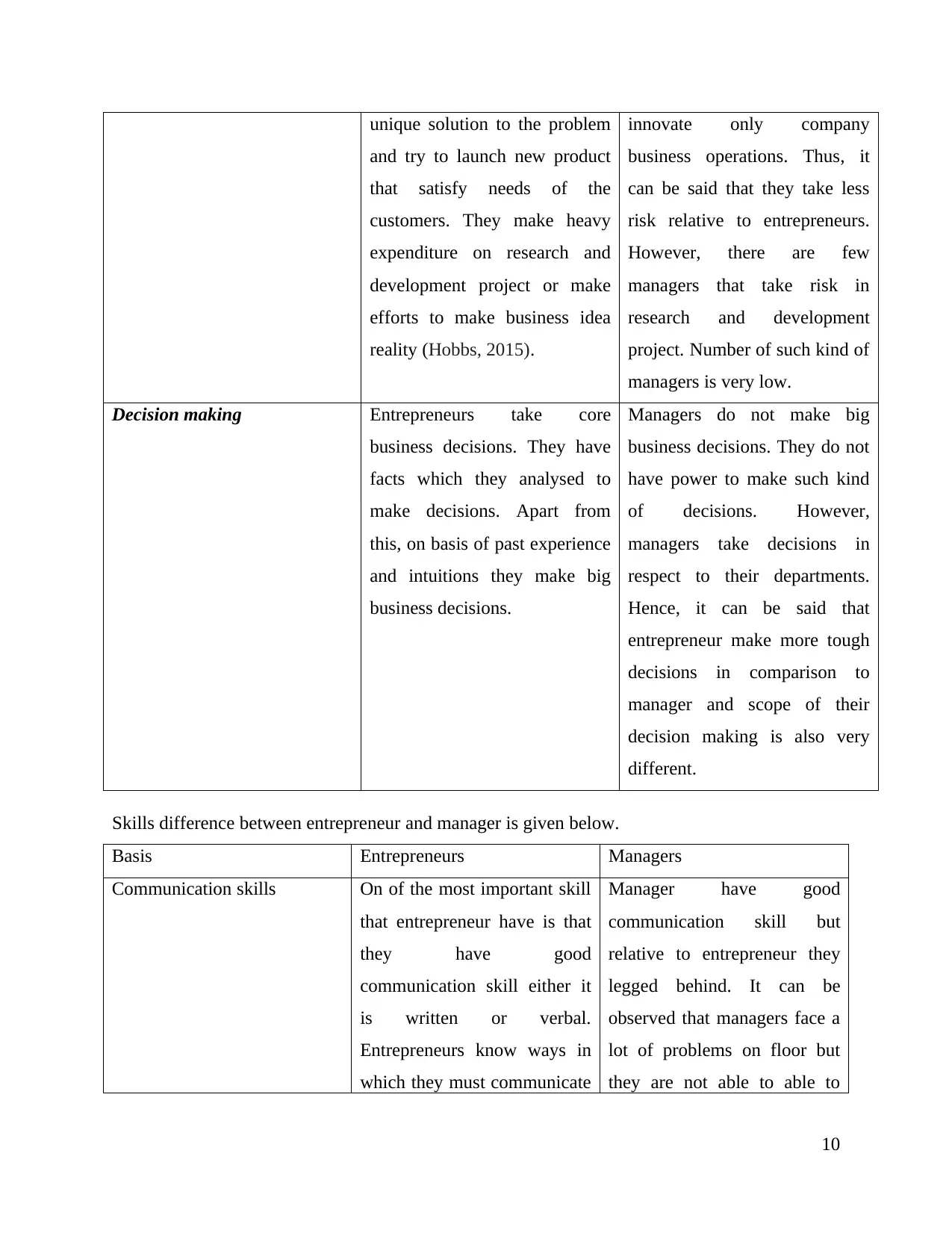
unique solution to the problem
and try to launch new product
that satisfy needs of the
customers. They make heavy
expenditure on research and
development project or make
efforts to make business idea
reality (Hobbs, 2015).
innovate only company
business operations. Thus, it
can be said that they take less
risk relative to entrepreneurs.
However, there are few
managers that take risk in
research and development
project. Number of such kind of
managers is very low.
Decision making Entrepreneurs take core
business decisions. They have
facts which they analysed to
make decisions. Apart from
this, on basis of past experience
and intuitions they make big
business decisions.
Managers do not make big
business decisions. They do not
have power to make such kind
of decisions. However,
managers take decisions in
respect to their departments.
Hence, it can be said that
entrepreneur make more tough
decisions in comparison to
manager and scope of their
decision making is also very
different.
Skills difference between entrepreneur and manager is given below.
Basis Entrepreneurs Managers
Communication skills On of the most important skill
that entrepreneur have is that
they have good
communication skill either it
is written or verbal.
Entrepreneurs know ways in
which they must communicate
Manager have good
communication skill but
relative to entrepreneur they
legged behind. It can be
observed that managers face a
lot of problems on floor but
they are not able to able to
10
and try to launch new product
that satisfy needs of the
customers. They make heavy
expenditure on research and
development project or make
efforts to make business idea
reality (Hobbs, 2015).
innovate only company
business operations. Thus, it
can be said that they take less
risk relative to entrepreneurs.
However, there are few
managers that take risk in
research and development
project. Number of such kind of
managers is very low.
Decision making Entrepreneurs take core
business decisions. They have
facts which they analysed to
make decisions. Apart from
this, on basis of past experience
and intuitions they make big
business decisions.
Managers do not make big
business decisions. They do not
have power to make such kind
of decisions. However,
managers take decisions in
respect to their departments.
Hence, it can be said that
entrepreneur make more tough
decisions in comparison to
manager and scope of their
decision making is also very
different.
Skills difference between entrepreneur and manager is given below.
Basis Entrepreneurs Managers
Communication skills On of the most important skill
that entrepreneur have is that
they have good
communication skill either it
is written or verbal.
Entrepreneurs know ways in
which they must communicate
Manager have good
communication skill but
relative to entrepreneur they
legged behind. It can be
observed that managers face a
lot of problems on floor but
they are not able to able to
10
⊘ This is a preview!⊘
Do you want full access?
Subscribe today to unlock all pages.

Trusted by 1+ million students worldwide
1 out of 20
Related Documents
Your All-in-One AI-Powered Toolkit for Academic Success.
+13062052269
info@desklib.com
Available 24*7 on WhatsApp / Email
![[object Object]](/_next/static/media/star-bottom.7253800d.svg)
Unlock your academic potential
Copyright © 2020–2026 A2Z Services. All Rights Reserved. Developed and managed by ZUCOL.





